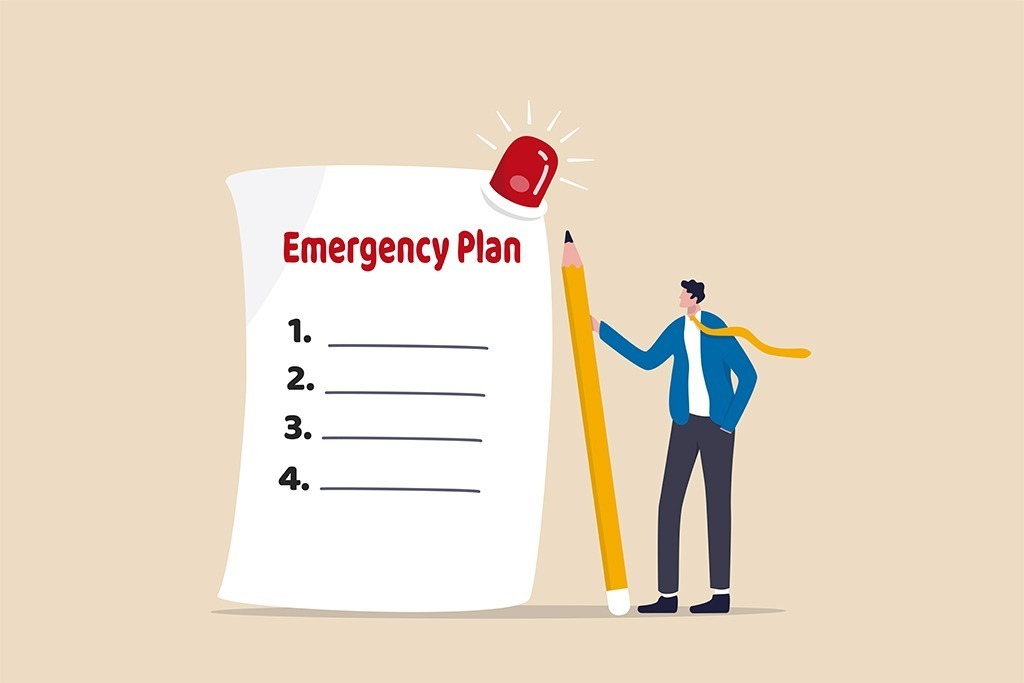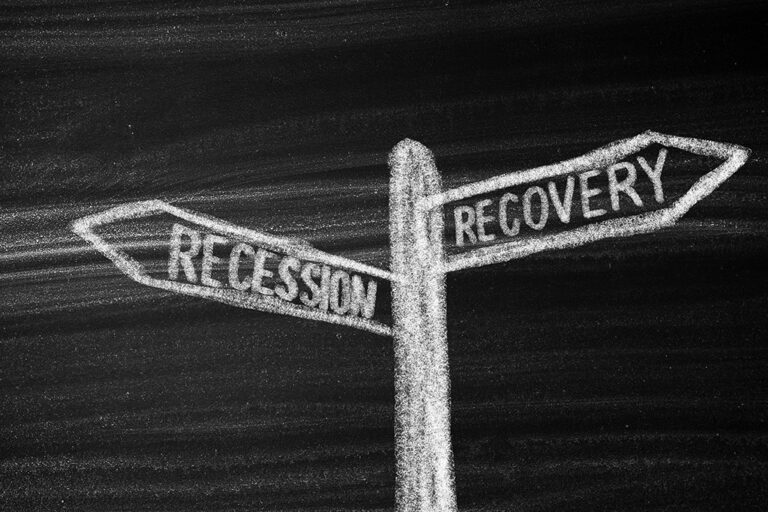On this page
What's next
Earn a high-yield savings rate with JG Wentworth Debt Relief
The information on this blog is provided for educational and informational purposes only. Such information or materials do not constitute and are not intended to provide legal, accounting, or tax advice and should not be relied on in that respect. We suggest that you consult an attorney, accountant, and/or financial advisor to answer any financial or legal questions.
There are lots of terms and phrases that we hear all our lives without every truly knowing exactly what they mean or how they work. Tax write-off. Algorithm. Supercalifragilisticexpialidocious.
However, there’s one word that being discussed an awful lot lately: recession.
Sure, we know that recessions are bad, and we’d like to avoid one at all costs. But what exactly IS a recession?
What is a recession, anyway?
Simply put, a recession is a chunk of time when a region or nation is faced with widespread economic struggles. During this time, the area’s gross domestic product (GDP), or the overall value of the goods and services it produces, falls drastically, and once-successful industries may suddenly become less profitable or start losing money.
To make matters worse, these challenges mean that consumers are often faced with inflation, layoffs and reduced job opportunities as companies tighten their belts. This creates a vicious cycle, as increased unemployment leads to consumers spending less money, drying up the economy even further.
Recessions have been caused lots of different things over the years. Back in 2008, for example, our country experienced a painful recession following a major collapse of the U.S. housing market. Just a few years ago, the U.S. battled recession due to unprecedented challenges in the hospitality, retail and tourism industries due to the COVID-19 pandemic.
Recessions aren’t fun for anyone to live through, but simply worrying about when the next one will rear its ugly head won’t accomplish anything (except driving you crazy!) Instead of waiting for disaster, you are much better off taking a few simple steps to prepare yourself for that next potential recession.

What should I do to prepare for a recession?
Build an emergency fund
We all know that it’s important to set aside money for those big, predictable life events that we plan for down the road – college, weddings, retirement and so on. But what about those unpredictable needs that can come at any time, like a recession? If you are suddenly laid off, or simply find yourself struggling to keep up with the inflate cost of food and gasoline, having some money stashed away could mean the difference between drowning in expenses or staying afloat.
There are lots of relatively painless ways to save extra money for an emergency fund, such as:
- Taking on extra work or odd jobs
- Cutting down on unnecessary spending
- Start a piggy bank to store any change you receive (hey, it adds up!)
- Save your “cash back” from credit card spending instead of using it for retail gift cards
- Setting up your banking automation to save a small chunk of every paycheck in a designated account
Update your resume
It doesn’t matter what industry or how much experience or seniority you may have in your current job. When recessions make things nasty for a company’s bottom line, absolutely no one is immune to the threat of layoffs. If that happens, the last thing you want is to waste time getting your ducks in a row instead of looking for a new job.
Don’t wait for disaster to strike. Instead, take a look at your most updated resume today. Is it up-to-date, or does it need revising? Does it need new references or work samples? If so, jump on that right away. Trust us – if that time comes that you need them, you’ll be glad you were prepared.
Pay down your high-interest debt
A wise man once said, “if you’re in a hole, stop digging.” If a recession puts you in a financial hole, the last thing you want is to be trapped with inescapable high-interest debt, making minimum payments that only serve to extend the terror of seeing your owed balance grow with every monthly bill.
In a recession (or any period of financial hardship that you may endure), finding a way to escape from high-interest debt should be your first priority. JG Wentworth’s Debt Resolution program is a fantastic option for those with at least $10K of unsecured debt, allowing our team of Debt Specialists to negotiate directly with your creditors to reduce your overall balances and create an easier path towards paying them off.* For others, Debt Consolidation loans could be the perfect solution for their needs.

Don’t Worry, Be Happy (and Prepared)
As Lynyrd Skynyrd once sang, “Troubles will come and they will pass.” Every recession in U.S. history has been temporary, but it’s always best to be overprepared in case our next economic struggle ends up lasting months, or even years.
Again, we’re not suggesting that you walk through life feeling concerned about a potential recession. In fact, one of the benefits of being prepared by taking the steps suggested above is that you won’t need to worry. With smart planning, you’ll be ready to weather the storm of a recession and come out the other side stronger than ever.
If you have any questions about Debt Resolution Program or exploring other avenues to help you build up an emergency fund or fulfill other financial goals, JG Wentworth is always here to help! Feel free to give us a call at 855-688-9669 and we’ll be glad to provide suggestions and information about our plethora of options that have helped customers succeed in their own financial journeys for over thirty years.
Sources Cited
Equifax. Five Ways to Prepare for a Recession. Equifax. Retrieved from https://www.equifax.com/personal/education/personal-finance/five-ways-to-prepare-for-a-recession/
Stone, L. (2023, January 9). Time For Recess. Retrieved from https://www.morningbrew.com/money-scoop/stories/2023/01/09/time-for-recess.
About the author
Recommended reading for you
* This is a Debt resolution program provided by JGW Debt Settlement, LLC (“JGW” of “Us”)). JGW offers this program in the following states: AL, AK, AZ, AR, CA, CO, FL, ID, IN, IA, KY, LA, MD, MA, MI, MS, MO, MT, NE, NM, NV, NY, NC, OK, PA, SD, TN, TX, UT, VA, DC, and WI. If a consumer residing in CT, GA, HI, IL, KS, ME, NH, NJ, OH, RI, SC and VT contacts Us we may connect them with a law firm that provides debt resolution services in their state. JGW is licensed/registered to provide debt resolution services in states where licensing/registration is required.
** Program length varies depending on individual situation. Programs are between 24 and 60 months in length. Clients who are able to stay with the program and get all their debt settled realize approximate savings of 43% before our 25% program fee.
Debt resolution program results will vary by individual situation. As such, debt resolution services are not appropriate for everyone. Not all debts are eligible for enrollment. Not all individuals who enroll complete our program for various reasons, including their ability to save sufficient funds. Savings resulting from successful negotiations may result in tax consequences, please consult with a tax professional regarding these consequences. The use of the debt settlement services and the failure to make payments to creditors: (1) Will likely adversely affect your creditworthiness (credit rating/credit score) and make it harder to obtain credit; (2) May result in your being subject to collections or being sued by creditors or debt collectors; and (3) May increase the amount of money you owe due to the accrual of fees and interest by creditors or debt collectors. Failure to pay your monthly bills in a timely manner will result in increased balances and will harm your credit rating. Not all creditors will agree to reduce principal balance, and they may pursue collection, including lawsuits. JGW’s fees are calculated based on a percentage of the debt enrolled in the program. Read and understand the program agreement prior to enrollment.
JG Wentworth does not pay or assume any debts or provide legal, financial, tax advice, or credit repair services. You should consult with independent professionals for such advice or services. Please consult with a bankruptcy attorney for information on bankruptcy.







